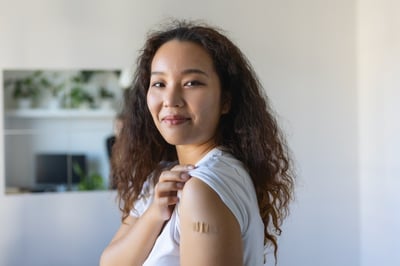Detrás de los titulares sobre el cáncer
Obtener más información sobre el programa de XRAY



Relevancia: Media
Este artículo es de mayor interés para: Personas sanas con alto riesgo de padecer cáncer de ovario.
Estudio: El consumo frecuente de aspirina puede disminuir el riesgo de padecer cáncer de ovario
La aspirina puede ayudar a disminuir el riesgo de padecer cáncer de ovario en personas con alto riesgo de padecer esta enfermedad, de acuerdo con un nuevo análisis de 17 estudios. Si bien se ha descubierto que hay otras estrategias de prevención más eficaces para disminuir la probabilidad de desarrollar cáncer de ovario en mujeres con alto riesgo de padecer esta enfermedad, consumir aspirina diario o casi diario puede disminuir un 13 % el riesgo de la persona de desarrollar cáncer de ovario. El beneficio fue mayor en personas con factores de riesgo adicionales de padecer la enfermedad. (Publicado el 2/22/23)
Leer más ›


Relevancia: Media-alta
Este artículo es de mayor interés para: Personas con cáncer de mama metastásico ER+/PR+ y HER2-.
Estudio: Trodelvy tiene resultados favorables en personas con cáncer de mama metastásico positivo al receptor hormonal
El estudio TROPiCS-2 demostró que el medicamento Trodelvy (sacituzumab govitecán) mejoró la supervivencia sin progresión en comparación con la quimioterapia en personas con cáncer de mama metastásico avanzado positivo para receptores de estrógeno y progesterona (ER+/PR+) y negativo al receptor 2 del factor de crecimiento epidérmico humano (HER2-) que no tienen acceso a muchas opciones de tratamiento. Este medicamento todavía no cuenta con la aprobación de la Administración de Alimentos y Medicamentos (FDA) para tratar el cáncer positivo al receptor hormonal (HR+). (Publicado 18/1/23 )
Actualización: El 03/02/2023, la FDA aprobó Trodelvy para pacientes con cáncer de mama localmente avanzado o metastásico que han recibido terapia hormonal y al menos otros dos tipos de tratamiento en el entorno metastásico.
Leer más ›


Relevancia: Media
Este artículo es de mayor interés para: Personas que tienen riesgo de padecer cáncer de mama triple negativo y piensan someterse a una mastectomía bilateral preventiva
Actualización: El estudio de la vacuna contra el cáncer de mama inicia con la participación de personas con mutaciones en los genes BRCA1 y PALB2
Una nueva vacuna desarrollada se aplicó primero a personas diagnosticadas con cáncer de mama triple negativo. En la actualidad, la vacuna se está sometiendo a prueba para prevenir el cáncer de mama en personas con una mutación hereditaria en el gen BRCA1 o PALB2 que tienen un mayor riesgo de tener la enfermedad y planean someterse a una mastectomía preventiva.(Publicado el 1/9/23)
Leer más ›



Relevancia: Alta
Este artículo es de mayor interés para: Personas con cáncer de ovario avanzado
Estudio: ¿Qué factores influyen en recibir una atención más agresiva en la etapa final de la vida para el cáncer de ovario?
Por lo general, el tratamiento médico agresivo lo reciben las personas con cáncer de ovario terminal cuando el tratamiento anterior deja de tener efecto. Este tratamiento agresivo en la etapa final de la vida contradice las directrices médicas porque puede aumentar el dolor y el sufrimiento, además de que no extiende el tiempo de vida de la persona. Este estudio encontró que la atención en la etapa final de la vida que recibe una persona con cáncer de ovario está influenciada por los médicos. (Publicado el 1/3/23)
Leer más ›


Relevancia: Media-alta
Este artículo es de mayor interés para: Hombres con cáncer de mama
Estudio: Cáncer de mama en hombres: experiencias de pacientes y cirujanos
Les pedimos a los pacientes con cáncer de mama y a los cirujanos que tratan a estos pacientes que contestaran una encuesta. Los investigadores conocieron las experiencias de los dos grupos y aprendieron más sobre el tema del cáncer de mama en hombres. (Publicado el 12/22/22)
Leer más ›


Relevancia: Alta
Este artículo es de mayor interés para: Indígenas estadounidenses y nativas de Alaska
Tema: Desigualdades por cáncer en las poblaciones indígenas estadounidenses y nativas de Alaska
La Sociedad Estadounidense contra el Cáncer (ACS, por sus siglas en inglés) incluyó una sección especial en su informe de hechos y cifras sobre el cáncer de 2022 que habla del tema de las desigualdades por cáncer en las poblaciones indígenas estadounidenses y nativas de Alaska que habitan en Estados Unidos. Esta publicación subraya los puntos principales de la sección especial, incluyendo las desigualdades en la detección, diagnóstico y niveles de supervivencia en comunidades nativas, así como los factores que contribuyen a que se presenten estas desigualdades. (Posted 12/20/22)
Leer más ›


Relevancia: Media-alta
Este artículo es de mayor interés para: Las personas actualmente en tratamiento contra el cáncer
Directrices: Pautas sobre ejercicio, dieta y peso durante el tratamiento del cáncer
La mayoría de las pautas profesionales sobre ejercicio, dieta y control del peso se han centrado en la salud de la población general y los supervivientes de cáncer. La Sociedad Estadounidense de Oncología Clínica (ASCO) ha publicado ahora recomendaciones basadas en pruebas sobre ejercicio, dieta y peso específicamente para personas que están en tratamiento activo contra el cáncer. (Publicado el 29/11/2022)
Leer más ›


Relevancia: Media-alta
Este artículo es de mayor interés para: Personas con cáncer colorrectal en etapa inicial
Estudio: Las biopsias líquidas ayudan a personalizar el tratamiento contra el cáncer de colon en etapa inicial
Las biopsias líquidas localizan el ADN y otros materiales de las células cancerosas en la sangre o en otros fluidos corporales. Estas pruebas pueden ser de ayuda para detectar con anticipación la reaparición del cáncer, vigilar la respuesta al tratamiento u orientar la selección del tratamiento para las personas que recibieron un diagnóstico de cáncer. Este estudio analizó un tipo de biopsia líquida llamada “tumoral circulante” (ADNtc) para identificar a las personas con cáncer de colon en etapa inicial que pueden omitir la quimioterapia sin correr riesgos después una cirugía. (22/11/22)
Leer más ›


Relevancia: Media-alta
Este artículo es de mayor interés para: Personas con cáncer de recto con una alta carga mutacional tumoral o problemas de reparación de desajustes, incluidas personas con síndrome de Lynch
Estudio: Resultados prometedores, aunque prematuros, para personas con cáncer de recto con deficiencia de reparación de desajuste de ADN
Un pequeño estudio de investigación puso a prueba la utilidad del fármaco de inmunoterapia llamado dostarlimab para tratar cáncer de recto localmente avanzado con un biomarcador conocido como “dMMR” (deficiencia de reparación de desajuste de DNA). Ninguno de los participantes presentó cáncer evidente seis meses después; algunos permanecieron sin cáncer durante hasta 25 meses. Muchos participantes padecían síndrome de Lynch. Es posible que la extraordinaria reacción a este tratamiento permita a las personas que padecen este subtipo de cáncer de recto en particular evitar someterse a cirugía del recto que potencialmente puede cambiarles la vida. (Publicado el 14/11/22)
Leer más ›


Relevancia: Alta
Este artículo es de mayor interés para: Personas con síndrome de Lynch
Estudio: La prueba de detección de cáncer de próstata puede beneficiar a las personas con síndrome de Lynch
Los resultados iniciales del estudio IMPACT demuestran que la prueba PSA para detectar cáncer de próstata en personas con síndrome de Lynch puede detectar cánceres de próstata en etapa inicial. Estos resultados respaldan el uso de pruebas de detección PSA en hombres con síndrome de Lynch, en específico en hombres con una mutación hereditaria en el gen MSH2 o MSH6. (Publicado el 10/11/22)
Leer más ›